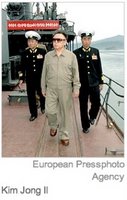
What if your government told you that North Korea had developed and was preparing to test a three-stage-long-range-ballistic missile that could reach out and touch you with nuclear catastrophe in almost all of America?
And what if it wasn't just the CIA and Dick Cheney telling you so, but the governments of Japan, Australia and New Zealand. Would that influence your decision?
Why not send the jets in now?
READ:
June 25, 2006
Don't Shoot. We're Not Ready.
By DAVID E. SANGER
WASHINGTON
SO what if North Korea shoots off its newest missile and shows that even a starving, bankrupt country may soon be able to drop a warhead on Seattle?
The Bush administration seemed to be insisting last week that it would make little difference, after officials acknowledged that a long-range Taepodong 2 had been rolled out and appeared fueled for a test flight ? but then sat there, an enigma, for days.
In private, administration officials dismissed the threat the missile might pose even if it flew straight, asserting that the logic of deterrence that worked throughout the cold war would do just fine. The North Koreans know, they said, that a missile attack on the United States would result in the vaporization of Pyongyang. Even Vice President Dick Cheney, who three years ago was warning the world about the dire threat posed by Iraq ? which had neither nuclear weapons nor long-range missiles to launch them ? shrugged off the North's missile technology as "fairly rudimentary."
Mr. Cheney briefly mentioned the North's boasts that it has developed a small nuclear arsenal. But he skipped past the conclusion of a recently completed National Intelligence Estimate that the boast is probably true, and that on Mr. Bush's watch, the North had likely produced enough plutonium for six or more weapons.
And that is the real problem: Missile tests yield big headlines, but the deeper fear is that while America is tied up in the Middle East, North Korea could become a full-service Wal-Mart for Iran or, worse, terror groups like Al Qaeda. The North already sells missiles; the worry is that in a few years it could have spare warheads to sell. too, or at least the fuel for one.
So another argument was heard last week: that Mr. Bush, having gone into Iraq on bad intelligence about weapons that never existed, could be erring now in the other direction ? deliberately whistling past the warheads in Pyongyang, in hopes that the problem will solve itself. In one of the great role-reversals of recent Washington politics, two of President Clinton's top defense officials argued that the only prudent response to North Korea's threats to test its missile would be to warn Kim Jong Il to dismantle it, and blow it up on the launch pad if he refused. In short, launch a pre-emptive strike ? taking the most famous page right out of Mr. Bush's own National Security Strategy.
"Should the United States allow a country openly hostile to it and armed with nuclear weapons to perfect an intercontinental ballistic missile capable of delivering nuclear weapons to U.S. soil?" former Defense Secretary William J. Perry and one of his top nuclear aides, Ashton B. Carter, asked in an Op-Ed article in The Washington Post. "We think not."
As the advice sped around Washington, President Bush's national security adviser, Stephen Hadley, dismissed it. "What we hope they will do is give it up and not launch," he said. He declined to say what the United States would do if Mr. Kim failed to take his counsel.
What is going on here is the latest twist in the never-ending debate of the Bush era: When is military pre-emption justified and ? a very different question ? when does it make sense?
"It is the most bizarre situation," said Robert Gallucci, the chief American negotiator with North Korea during the Clinton administration, and now dean of the School of Foreign Service at Georgetown University. He disagrees with Mr. Perry and Mr. Carter about the prudence of pre-emption now. But he also argues that Mr. Bush "bears some responsibility" for the current standoff. "The United States essentially adopted a policy of doing nothing about North Korea for six years. And now, we look up from Iraq and here is a situation where preemption's got all sorts of problems, and doing nothing" seems unpalatable as well.
In fact, however certain they were that pre-emption was right for Iraq, administration officials have seemed uncertain what to do about the North, alternately labeling it part of the "Axis of Evil" and dismissing it as an isolated, friendless nation that one day will collapse.
Mr. Hadley, a veteran of the arms control battles of the cold war, has pointedly declined to talk about setting "red lines" for the North Koreans, as the Soviet Union and the United States did for each other. Mr. Hadley has argued in the past that red lines don't work with North Korea, because it steps right over them.
The result of not setting any, though, is that North Korea has simply stepped over the places where red lines might have been: It threw international nuclear inspectors out of the country three years ago, withdrew from the Nuclear Non-Proliferation Treaty, and boasted about turning its supply of spent nuclear fuel into bomb-grade plutonium. Mr. Perry argues that President Clinton was ready to destroy the North's nuclear facilities in 1994. Others in the Clinton administration are not so sure, but it hardly matters; the posture seemed to work ? at least until North Korea was found cheating on the deal that resulted, which had been designed to freeze its nuclear weapons program.
Now, Mr. Perry and Mr. Carter argue, benign neglect has gotten too dangerous.
In essence they want to take a page out of John F. Kennedy's playbook during the Cuban missile crisis: Warn the North Koreans that they have a set amount of time to "put the missile back in the barn," in Mr. Perry's words, or watch it destroyed by a cruise missile. Yes, they acknowledge, the result could be a war on the Korean Peninsula, but they doubt it would come to that. "I thought in '94 that any action would lead to North Korea striking back," Mr. Perry said in an interview. "I'm less concerned about it today. They have less capability and this is a less serious action." There are many scenarios short of war: terror attacks on South Korea or Japan, and slipping a bomb into a cargo ship. Without question, any risk of war would be a huge roll of the dice, one Mr. Bush seems disinclined to gamble on when so many American troops are needed in Iraq. Mr. Cheney cautioned on Thursday that "if you're going to launch strikes at another nation, you'd better be prepared to not just fire one shot."
Such cautions are heard all the time, of course. The news was that this one was aimed at two Democrats by an administration that had pledged after 9/11 to keep the world's worst weapons out of the hands of the world's worst dictators ? and, in doing so, had pegged its fortunes to its ability to pre-empt at the right moment, and in the right place.

No comments:
Post a Comment